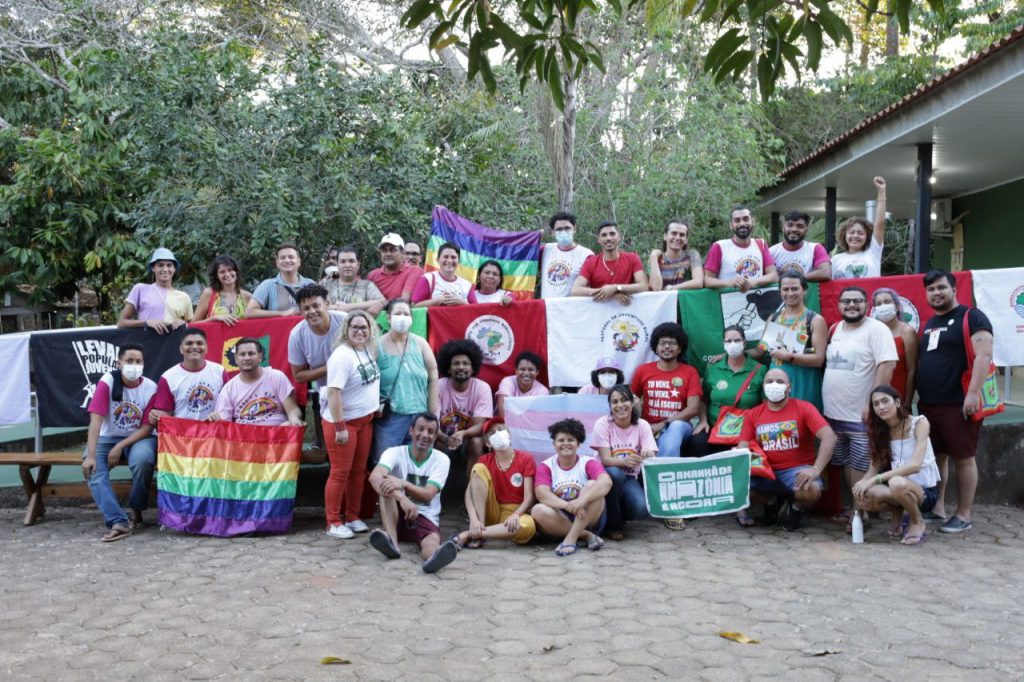Brazil: La Via Campesina’s LGBTI+ Seminar addresses diversity in the rural areas

The 1st State Seminar on Sexuality and Sexual Diversity organized by La Via Campesina brought together around 50 LGBTI+ people from various movements and organizations from the state and the country.
Held in Rondônia on July 9 and 10, the 1st State Seminar on Sexuality and Sexual Diversity of La Via Campesina brought together around 50 LGBTI+ people from various movements and organizations from the state and the country, based on an agenda that raised the following lines of discussion: the Political Electoral Situation; the LGBTI Situation in Brazil and in Rondônia; Patriarchy, Sexual Diversity and Gender. The event also became a space for articulation, inclusion and listening, providing tools to analyze the role of La Via Campesina in the debate. By means of discussion tables, rounds of conversation and presentations, the debate raised the challenges faced by LGBTI+ people who live and work in the countryside, with the forests and the waters.
Representation
Dê Silva, from the LGBTI Collective of Via Campesina Brazil, was one of the mediators of the roundtable entitled “LGBTI+ Situation in Brazil and in Rondônia”, held on Saturday (9th). Silva talked about the historical challenges of occupying the political space and keeping an active participation there, defending the demands as LGBTI+ political subjects. She also expressed the need to deconstruct and demystify the various oppressions and stigmas that currently exist in the Brazilian countryside. Karen Oliveira, from Comunidade Cidadã Livre (Comcil), discussed the importance of creating networks where politics may flow and where any LGBTI+ person may be welcomed, as if it were in the family circle, as a child or a father/mother.
Adding to the topic, Fabíola Ocampo, from the group called “Mães pela Diversidade” from Rondônia, shared the story and the difficulties that she and her daughter had to face, and the relevance of being welcomed by their families and loved ones to defend the guarantees of LGBIT+ people. Braian, from Levante Popular da Juventude (PJR), a bisexual trans man, spoke about the transition process and highlighted the importance of family and territorial aspects for his acceptance process.
Jean Carlos Sena, from the National Coordination for the Articulation of Quilombola Areas (CONAQ) and a quilombola professor at the Pedras Negras Community (São Francisco do Guaporé – RO), spoke about the difficulty in accessing information and the resistance to the LGBTI+ agenda. Valter Passos, from the Unified Black Movement (SINTERO), made a presentation about the conservative base in the unions and the “difficulty to visualize, propose and apply the guidelines of the LGBTI+ community”.
Cultural Night
The first day of the seminar concluded with a cultural night, featuring a presentation by drag queens Renata Evans and Carol Maynne, and the group As de Saias. The flags of the movements represented at the seminar joined the pennants of the June celebrations, with typical food and interaction with the audience.
Challenges
Renata Evans opened the following day’s Mystica, and then Cleverton Reikdal, Coordinator of the Law course at the Catholic University of Rondônia (FCR), spoke about the civil registry rectification process, according to their gender identity. Sharing the same round table, Rogério Teles, addressed the importance of advocacy in the judicial system, aimed at ensuring the rights of the LGBTI+ community, and the achievements in this area, mainly referring to the Brazilian Judiciary.
While debating on ‘Why La Via Campesina needs to advance in its understanding of diversity’, three policy lines were presented to guide the dialogue: Food sovereignty; Agrarian reform: the right to land and production; Construction of an alternative society to capitalism, the need for women’s organization and the struggle for self-assertion.
Among these lines, it was highlighted that the LGBTI Collective of La Via Campesina is committed to including gender equality and sexuality issues to the discussion on class struggle.
By Mário Manzi* | Source: MST
*Communication Advisory of the National CPT
**Edited by Maiara Rauber
***Cover Photograph: Mário Manzi.
